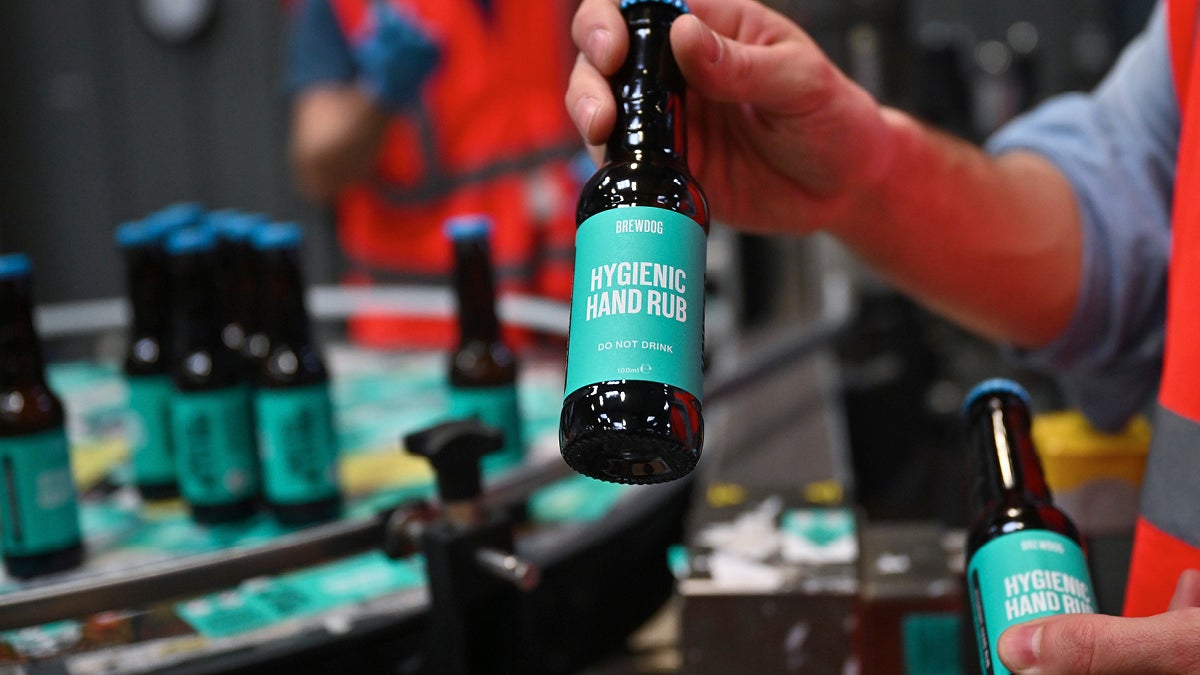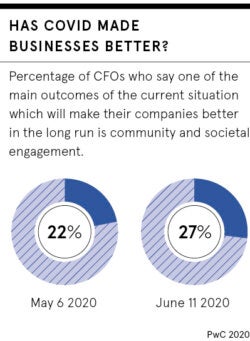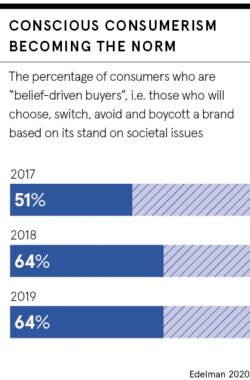
If there’s one thing company executives can agree on in 2020, it’s that the concept of “business as usual” feels like a relic of the past. The challenges brought by the coronavirus pandemic have pushed governments, society, institutions and individuals to their limits. In a business context, unforeseen volatility has exposed vulnerabilities in many organisations, forcing closures for some, and restructuring, redundancies and a rethink for others.
Among the chaos, pressure has also increased on businesses to pivot in favour of helping to support the overall effort in fighting the disease. As the dust settles on the first wave of the virus, and at the outset of the second, the scale of what has been lost and gained in the business world over the last ten months becomes clearer.
Stories abound of enterprises that have used their influence, infrastructure and financial capital to support governments and institutions for the common good.
Business strategies for social impact
It’s a trend that has seen globally renowned luxury goods manufacturers, such as LVMH, pivot operations to make and provide hand sanitiser and masks for local hospitals in vast quantities, or car manufacturer Ford making ventilators in the United States.
Closer to home, large hotel chains in the UK provided shelter for homeless people and BrewDog, a popular Scottish brewery, produced hand sanitiser. Food companies such as BOL provided 21,000 meals to the NHS and homeless charities, and CMG Leisure, a sex toy manufacturer, used its facilities to make “ear savers” for NHS workers.

A decade or so ago, it may have been hard to imagine that businesses would play such a critical role in supporting government and society at large in the face of a deadly pandemic. But these days consumers don’t just appreciate the concept of corporate social responsibility, they expect it.
According to the 2020 Edelman Trust Barometer, 64 per cent of consumers in 2019 were “belief-driven buyers”, who feel brands can be a powerful force for change, compared with 51 per cent in 2017, showing a strong growth trend over a relatively short period.
Put plainly, from a consumer perspective, it is no longer enough for businesses to just be good at what they do, if they are not also doing good in the process. But in an increasingly difficult external environment, as we move through a second, even more serious, wave of the virus, can companies be expected to retain their focus on business strategies for social impact? And what are the risks for those that do not?
The pressure to remain socially responsible
“During the first wave of the pandemic, businesses showed they could pull together and tackle serious issues,” says Kate Hartley, co-founder of Polpeo and author of Communicate in a Crisis. “We started to rethink what, and who, really matters to our society.”
It makes sense. At the time, the crisis was front and centre of everything, occupying headlines worldwide, and the threat was largely unknown. People were scared, which had a powerful galvanising effect, encouraging social cohesion and prompting businesses to look beyond their own profits to a greater social impact.
Businesses can do amazing things for society. If, post-COVID, they choose not to, they will face a bigger backlash than ever before
But as we move through the second COVID wave, the business operating environment has shifted dramatically. In the context of an oncoming recession, and as reality sinks in that the pandemic may have irrevocably shifted the way we live, work and socialise, those businesses managing to stay open are already under significant pressure to adapt to the constantly changing environment.
The question is will they be able to retain business strategies for social impact at a time when many are fighting for survival?
“I think we’ve seen that businesses can, if they choose to, do amazing things for society. If, post-COVID, they choose not to do those things again, but simply chase profits at the expense of societal good, they will face a bigger backlash than ever before,” Hartley, who advises firms on reputational risks, believes.
“We care more about our collective health, our environmental impact, and our human rights than ever before. In some ways, there will be no business as usual. Everything has changed.”
She advises business leaders to shift their thinking away from returning to business as usual and focus instead on seeing opportunities in the new normal. There are reputational benefits for those able to balance the tandem pressures of cultivating effective business strategies that are also drivers of positive social impact.
Leaders who cultivate purpose stand to gain

For brands like LVMH that refocused an entire supply chain in the space of 48 hours in May to supply hospitals in Paris with personal protective equipment, retaining such a high level of altruism beyond the pandemic is not likely to be sustainable. But the brand insists social impact is built into its corporate DNA, enabling them to continue to support worthy causes even as we move out of the crisis.
According to LVMH: “We have a responsibility to do good when things are going well, not just in times of crisis.” And while it’s true this might be much easier for a multinational estimated to be worth $134 billion than a startup or other small business, their perspective highlights a challenge that should be high on the agenda of business leaders as we begin thinking about the transition to a post-COVID existence.
It is clear in 2020 consumers expect more from brands than before, making business strategies for social impact both highly rewarding and highly risky, if they are not driven by a genuine motive. When the threat of COVID-19 begins to fade, brands combining a clear purpose with strong ethics, and making only authentic and achievable commitments, will be in a stronger position than those that do not.

If there’s one thing company executives can agree on in 2020, it’s that the concept of “business as usual” feels like a relic of the past. The challenges brought by the coronavirus pandemic have pushed governments, society, institutions and individuals to their limits. In a business context, unforeseen volatility has exposed vulnerabilities in many organisations, forcing closures for some, and restructuring, redundancies and a rethink for others.
Among the chaos, pressure has also increased on businesses to pivot in favour of helping to support the overall effort in fighting the disease. As the dust settles on the first wave of the virus, and at the outset of the second, the scale of what has been lost and gained in the business world over the last ten months becomes clearer.
Stories abound of enterprises that have used their influence, infrastructure and financial capital to support governments and institutions for the common good.
